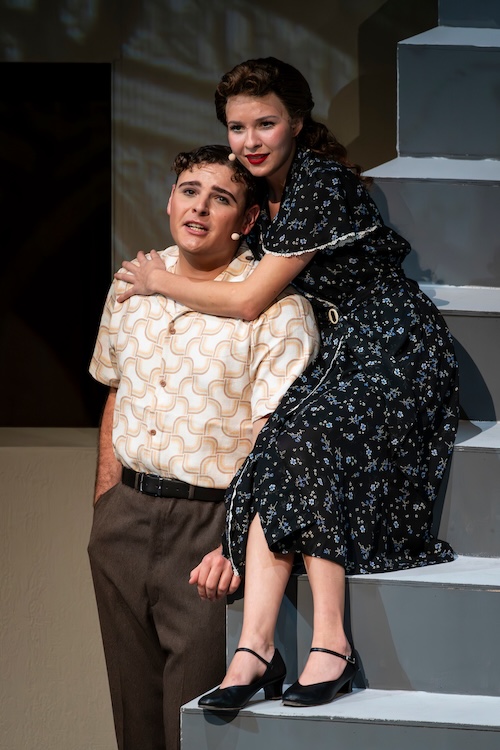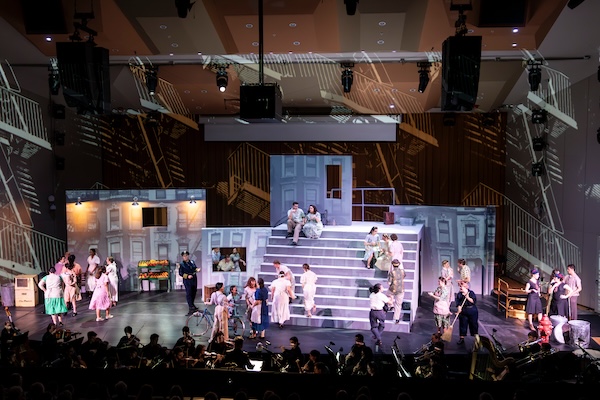Frost Opera Theater serves up a memorable “Street Scene”

Rachel Wresh as Rose Maurrant with Alessandro Fanan as Sam in Frost Opera Theater’s production of Kurt Weill’s Street Scene. Photo: Shawn Clarke
In the late 1940’s, the worlds of opera and Broadway theater seemed to be moving closer together. Kurt Weill’s Street Scene is a prime example of that fusion.
On Thursday night, the Frost Opera Theater opened a two-performance run of Weill’s American verismo drama at the University of Miami’s Gusman Concert Hall. With a talented cast of young singers and inventive staging, the nearly flawless presentation proved one of the Frost Opera’s finest productions ever.
The opera is based on Elmer Rice’s 1929 play (and the subsequent 1931 Hollywood film). A tale of poverty, gossip, adultery, murder and shattered love, Rice’s melodrama is mother’s milk for operatic adaptation. If Mascagni or Leoncavallo were writing in America, one could easily imagine them setting this story. Weill was one of the great melodists, both in his Weimar-era German operas and musicals and later American scores. Street Scene displays his versatility for orchestral and choral writing and his skill as a tunesmith.
The score requires a large cast and the Frost singers were outstanding, both vocally and dramatically, from the major leading roles to the many smaller parts. As the tragic heroine Anna Maurant, Josie Gore was first among equals. Her powerful yet finely textured and multi-hued soprano has a potent edge at the top. In the aria “Somehow I could never believe,” she conveyed a real sense of dramatic projection, pouring out Maurant’s sadness about her tortured existence and hapless marriage. In a cast with consistently strong diction, Gore’s projection of the text was outstanding.
From his first entrance, David Daj-Han Lee radiated a sense of danger as Anna’s brutal husband Frank Maurant. His rich, firmly supported baritone made his solo “Let things be like they always was” a highlight of the evening. Lee showed a softer side in his confession and apology to his daughter Rose after he operas tragic double murder.
Rachel Wresh’s light soubrette soprano was perfect for the youthful, dreamy Rose Maurant. “What good would the moon be” is one of Weill’s most beguiling melodies and Wrench spun it with idiomatic ardor. Playing law student Sam Kaplan (Rose’s lover), Alessandro Fanan’s plangent lyric tenor imbued the bluesy “Lonely House” with fervor and showbiz flair. Wresh and Fanan’s voices blended perfectly in their scenes together, especially in the inspired duet “We’ll go away together” as they dream of a better life.
Holden Seward played Anna’s lover Sam Sankey, a milkman, with both hopeful passion and naivete. Virginia Dunlap was a flighty Willie Maurant, Anna’s other child (a son in the opera libretto but changed to a daughter in this performance).
Among the consistently excellent secondary characters, Brandon Flores’ personality-plus Lippo Fiorentino alighted the ice cream septet in his vibrant tenor. Matthew Reber showed the skills of an old-fashioned song-and-dance man with “Wouldn’t you like to be on Broadway?” as Harry Easter, Rose’s slimy, skirt-chasing boss.
Ashia Barnes and Xochitl Hernandez made the interlude of the nursemaids’ gossipy lullaby a standout moment. Alex Schneider’s acting skill turned Sam’s socialist father Abraham Kaplan into a colorful character portrait.
Conductor Yun Xuan Cao drew smooth and burnished playing from the Frost Symphony Orchestra and brought out the synthesis of operatic and populist elements in Weill’s score. Stephan Moravski’s imposing set mixed suggestions of tenement squalor and busy street life. Diego Mattallana’s lighting subtly underscored the work’s shifting moods of joy and pain, the multiple projections of photos of Weill embellishing the prelude.
Jeffrey Marc Buchman’s staging made the most of limited space while never seeming overcrowded. Buchman’s pitch perfect combination of searing drama and showbiz pizzazz illuminated the comedic and melodramatic elements of the libretto and lyrics by Langston Hughes and Rice. His ensemble tableaux following the murders was visually stunning. Rosa Mercedes’ eye-catching choreography lit up the stage.
There is one more performance of this seminal American work. Despite its student provenance, this Frost production can hold its own with the best professional presentations.
Frost Opera Theater repeats Street Scene 7:30 p.m. Saturday at the UM Gusman Concert Hall in Coral Gables. events.miami.edu
Posted in Performances
Leave a Comment
Fri Mar 1, 2024
at 1:22 pm
No Comments




